For the male nobility in the 12th and 13th centuries there was a right way to die. I am not talking about death on the battlefield, though that was acceptable too. I am talking about what was done when you knew you were dying. The best way to explain the differences is to examine the deaths of three important medieval figures. Henry the Young King who died in 1183, Henry II who died in 1189 and William Marshal who died in 1219. 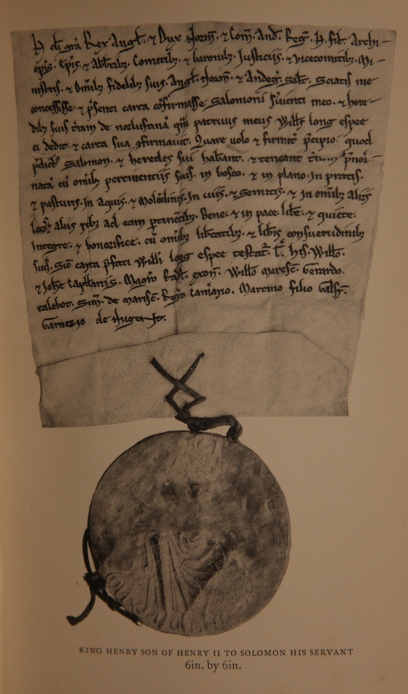 This is a charter from Henry the Young King from page 29 Stenton, FM. Facsimiles of Early Charters from Northamptonshire Collections. London: J.W Ruddock and sons. 1930. Henry the Young King was the second son of Eleanor of Aquitaine and Henry II. His elder brother William died in infancy though so the Young King was the heir to England, Anjou and Normandy. To read more about the life of the Young King see this excellent blog http://henrytheyoungking.blogspot.com.au. Suffice for now to say that he was crowned in his father’s lifetime, a common practice on the continent but a new practice for England, but was given very little real power. Henry II did not share power easily.
This is a charter from Henry the Young King from page 29 Stenton, FM. Facsimiles of Early Charters from Northamptonshire Collections. London: J.W Ruddock and sons. 1930. Henry the Young King was the second son of Eleanor of Aquitaine and Henry II. His elder brother William died in infancy though so the Young King was the heir to England, Anjou and Normandy. To read more about the life of the Young King see this excellent blog http://henrytheyoungking.blogspot.com.au. Suffice for now to say that he was crowned in his father’s lifetime, a common practice on the continent but a new practice for England, but was given very little real power. Henry II did not share power easily.
Henry the Young King was seen by his father as a spendthrift and was actually in rebellion against him when he died. The Young King had run out of money for the rebellion and he and his mercenaries had sacked the church of St Mary de Roche Andemar, stripped the tomb of Saint Andemar and carried away all the church’s treasures. When he became sick so soon after it was seen by some as divine retribution. The Young King however wiped all his earthly transgressions clean in his rather spectacular deathbed acts of repentance. Once it became clear that he was dying of a fever and a ‘flux of the bowels’ he repented of his sins and did it in a way that would now be seen as theatrical. Firstly he received absolution of his sins from a bishop and had his knight William Marshal agree to take his cloak, sewn with the crusader cross, to Jerusalem and fulfil his crusader’s vow. Secondly he put aside his fine garments and had himself laid on haircloth and had his men place a noose around his neck. He said “By this cord do I deliver myself, an unworthy, culpable, and guilty sinner, unto you, the ministers of God, beseeching that our Lord Jesus Christ, who remitted his sins to the thief when confessing upon the cross, will, through your prayers and His ineffable mercy, have compassion upon my most wretched soul.” Thirdly he had his men draw him from his bed by the cord and lay him on a bed strewn with ashes. Finally he commanded that two large stones were to be placed under his head and feet. With the mortification of the flesh complete to signify his repentance he died.[1] He was only 28.
The Young King’s death is one of those ‘what if’ moments in history, if he’d survived Richard the Lionheart may never have been king. This was a ‘good death’ because he had completely been freed from his sins, he had correctly repented, he’d died with his faithful men around him and he done it all in a manner befitting a king.
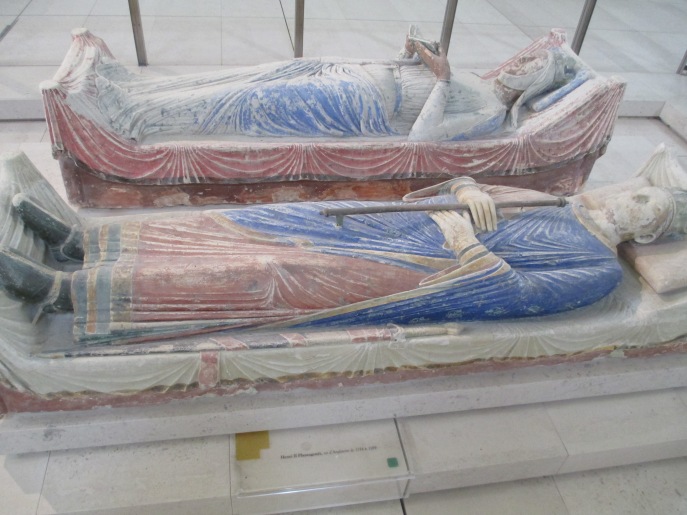
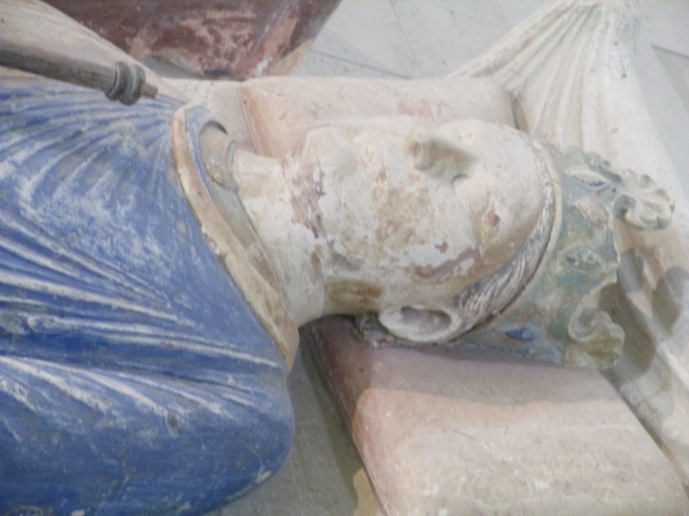 The photos are of the effigies of Eleanor of Aquitaine and Henry II in Fontevraud Abbey and a close up of the effigy of Henry II. Henry II’s death was very different to his son’s. Henry was one of the most interesting and important kings of this period. He was King of England, Duke of Normandy, Count of Anjou and Lord of Ireland. He also held Aquitaine by right of his wife and he held Brittany, though he had invested his son Geoffrey as its Duke. When he died his two remaining sons, Richard and John, were in rebellion against him and he did not die well.
The photos are of the effigies of Eleanor of Aquitaine and Henry II in Fontevraud Abbey and a close up of the effigy of Henry II. Henry II’s death was very different to his son’s. Henry was one of the most interesting and important kings of this period. He was King of England, Duke of Normandy, Count of Anjou and Lord of Ireland. He also held Aquitaine by right of his wife and he held Brittany, though he had invested his son Geoffrey as its Duke. When he died his two remaining sons, Richard and John, were in rebellion against him and he did not die well.
History of William Marshal goes into detail. “Death simply burst his heart with her own hands. Death’s discipline was a cruel one. A stream of clotted blood burst forth from his nose and mouth.”[2] It then goes on to say that “nobody had anything to cover his body, so he lay there, so poor and deprived of everything, without a stitch of linen or wool on him.[3] History continues that “all those who were standing around him and who were supposed to watch over his body, when they saw the King was dead, each and everyone appropriated for himself those possessions of the King they were meant to guard.[4] Roger of Hoveden confirms Henry’s sordid death saying “After his death, having plundered him of all his riches, all forsook him; so true it is that just as flies seek honey, wolves the carcass, and ants corn, this crew followed not the man, but his spoils.” [5] His loyal men were forced to clothe him in borrowed robes, as there was nothing else left. He was 56. King Henry died messily, without due ceremony and had his possessions stolen. This complied with none of the ideas of honour, or loyalty or generosity that were meant to be part of any noble death, especially a royal one. The next two photos are of the effigy of William Marshal which can be found in the Temple Church in London.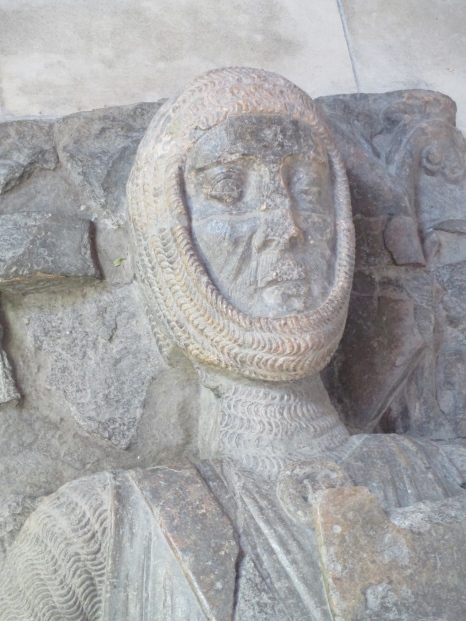
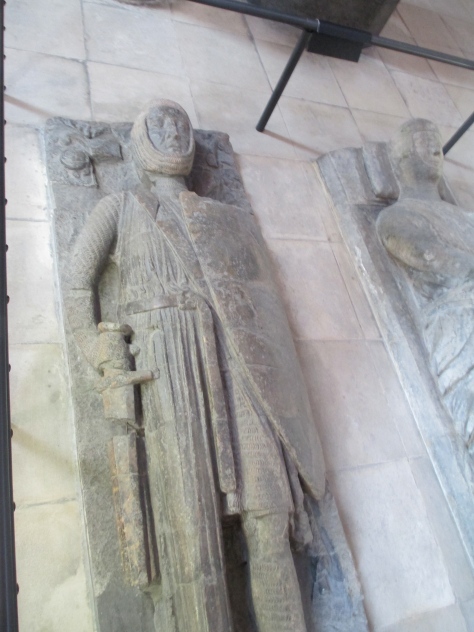
Our final death is that of William Marshal. Marshal was at the deathbeds of both Henry the Young King and Henry II. Marshal succeeded in life where both of them fell. He survived to die of old age. Marshal was approximately seventy-two when he died, which was very old for the medieval period, and he stage managed his final days. We have an extraordinarily detailed account of his deathbed due to the fact that his son had a biographical poem, History of William Marshal, commissioned. History of William Marshal devotes 1285 lines to Marshal’s death, from the first mention that Marshal is dying, until the end of the services after his death.[6] It is one of the most moving and detailed points of the narrative. Both the men responsible for History, the one who commissioned it, William Marshal the younger and the one who contributed his recollections, John of Earley, were at Marshal’s deathbed so there is no reason to doubt its authenticity especially when the level of detail is considered. Marshal’s death was conducted from his mansion in Caversham, where he went to wait out his final illness saying he “preferred to die at home than elsewhere.”[7] Marshal was Regent for the very young Henry III when he realised he was dying. So his first act was to very carefully handover Henry III and the realm into appropriate care.[8]
Marshal died surrounded by his family and his loyal men. The best example of the latter was John of Earley. It was Earley that Marshal sent to collect the cloths he had bought in Jerusalem over thirty years before, that he had “brought back with [him] from the Holy land, to be used for the purpose which they [would] now serve; [his] intention [had] always been that they [would] be draped over [his] body when [he was] laid in the earth.”[9] We know his wife Isabel was there with his daughters because when he had a desire to sing, but didn’t want to for fear of being called a madman, his knights suggested that his daughters and his wife might sing for him. The daughters came and sang but Isabel was too overcome with grief. [10] He also made sure to die with humility, joining the order of the Templars just before his death. He was made a Templar and Aimery de Saint-Maur, head of the Temple declared, “Marshal, listen to me: it pleases me that you surrender to God and set aside your worldly goods so as not to be separated from Him and his faithful servant. I can tell you that in life as in death you have known higher honour in this world than ever any other knight had, both in respect of your valour, it is true, and your wisdom and loyalty.”[11]
So in becoming a Templar Marshal ended his life in humility and honour in just about the most eye-catching way possible. In dedicating himself to the Templars he was marking himself as pious, dedicated and humble. He was making sure that his image after death was the correct one of humility and piety. His wife Isabel was also present when he took the vows of a Templar. We know this because one of the vows of a Templar is chastity, so moments before he took the vow he said to Isabel “Fair Lady kiss me now, for you will never be able to do again.’ She stepped forward and kissed him, and both of them wept.” [12]
Marshal was also overtly generous in his final days, firstly in saying to his son “give a portion of my wealth to all the poor you can see [in London] who have come to receive alms; make sure the distribution is such that it may be spoken of before God. And there is another thing I want to remind you of: give food and drink to one hundred of the poor, along with garments to clothe them and shoes.”[13] It is interesting to note though that he was overtly generous, he wanted make sure that his generosity was seen. Possibly because it was an attribute that was expected of a man in his position and it is how he wanted to be remembered. He also gave money in his will to a number of religious foundations. He provided for his knights too. One of his clerks wanted to sell off the robes that had been put aside for the knights’ Whitsuntide gift, but Marshal said “Hold your tongue, you wretch” “It will be Whitsuntide very soon, when my knights should indeed have their new robes for I shan’t be able to give them robes again.”[14] He went on to tell John of Earley to distribute the robes, “and, should any man fail to get his share, send immediately to London and see to it that you get more splendid ones, so nobody can complain.”[15]
When Marshal actually died he had done everything he was supposed to. He had taken leave of his family, he had said how he wished his possessions to be distributed, he had expressed piety and charity and God had absolved him of his sins. The Abbot of Notley performed the “ceremony of absolution”.[16] Also the papal legate had given him remission of all his sins for taking up the Regency in the first place.[17] Marshal’s death was, apart from dying in the holy land on crusade, probably the best way a medieval noble man could go. He died well: humble, pious and just a little bit theatrical. These three deaths represent very different ways of dying. Medieval dying need not be a reflection on a life. In death you could redeem yourself, but while dying badly held some shame it did not negate a good life.
[1] Roger of Hoveden, The Annals of Roger of Hoveden Volume II, pp. 26-27. [2] Holden & Crouch, (eds) History Vol II, pp. 397-461. [3] Holden & Crouch, (eds) History Vol II, pp. 429-431. [4] Holden & Crouch, (eds) History Vol II, p. 399. [5] Holden & Crouch, (eds) History Vol II, pp. 401-409. [6] Holden & Crouch, (eds) History Vol II, p. 413. [7] Holden & Crouch, (eds) History Vol II, p. 433 [8] Holden & Crouch, (eds) History Vol II, pp. 438-439. [9] Holden & Crouch, (eds) History Vol II, p. 439. [10] Holden & Crouch, (eds) History Vol II, p. 423. [11] Holden & Crouch, (eds) History Vol II, p. 451. [12] Holden & Crouch, (eds) History Vol II, pp. 420-421. [13] Holden & Crouch, (eds) History Vol II, p. 279. [14] Holden & Crouch, (eds) History Vol I, p. 463. [15] Holden & Crouch, (eds) History Vol I, p.463 [16] Holden & Crouch, (eds) History Vol I, pp. 463-464. [17] Roger of Hoveden, The Annals of Roger of Hoveden Volume II, p. 111. Roger of Hoveden. The Annals of Roger of Hoveden Comprising the History of England and Other Countries of Europe from A.D 732 to A.D 1201. (trans.) Henry T. Riley, Volumes I & II. London: H.G Bohn. 1853. Anonymous. History of William Marshal. (ed.) AJ. Holden. (trans.) S. Gregory & (notes.) David Crouch, Volumes I, II & III. London: Anglo-Norman Text Society. 2002.

It’s all very well when you know you are dying. What happens if you die of a heart attack with no warning? Also were women allowed good deaths? Great article.
LikeLike
In that case you want to be absolved of your sins if at all possible, same for women. This is about what happens when there is time to plan, or when things go badly wrong. Dying well was even more important with royalty.
LikeLike
Reblogged this on The Power of History.
LikeLike
What an excellent article.
One of the things I understand about the large disbursement to the poor was that when Henry II died there was no money to do so, which was a great black mark against the King. So Marshal is showing not only his own generosity to the poor but also that he is able to do what the greatest King of his time was unable to do. Moreover Marshal has been Regent of England for Henry’s grandson so he is acting as a king should.
LikeLike
glad you liked it Meg, and yes you’re right about Henry and Marshal.
LikeLike